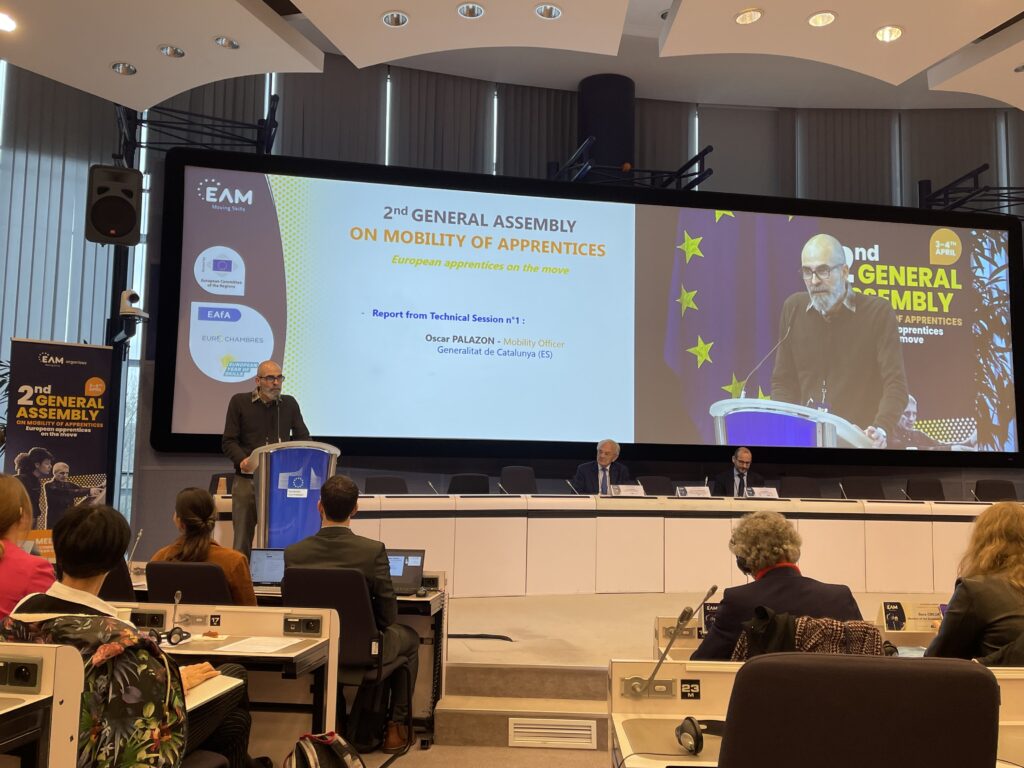Euro App Mobility organised its 2nd General Assembly focusing on the Mobility of Apprenticeships
10/04/2024

On the 3-4 April 2022, the Euro App Mobility organised its 2nd General Assembly focusing on the Mobility of Apprenticeships at the Committee of Regions (Brussel). This organisation aims to be an accelerator of long-term mobility of apprentices in Europe. In the context of the European Year of Skills, the Euro App Mobility network joined forces with EuroChambes and the European Alliance for Apprenticeship (EAfA) to gather more than 300 mobility experts, coming from 28 European countries and beyond.
On this occasion, the aim was to discuss recent development on the apprentices mobility and to work together in a proposal for a call for action under the theme “Towards a European Area for Apprenticeship and Vocational Training Erasmus+.” EARLALL network participated as the subject of Mobility of Apprenticeships is of interest of our members regions and our members have been discussing this topic in the Working Groups meetings.
The Assembly was organised in the backdrop of the European Commission’s proposal for a Council Recommendation “‘Europe on the Move’ – learning mobility opportunities for everyone.” The final text is expected to be adopted in the next Council Meeting in May 2024.
The Council Recommendation was the main topic of discussion of the opening session where speakers from the European Commission, the Erasmus+ French National Agency, Members of the European Parliament and the Committee of the Regions were invited to share their reflections on the recommendation proposal. In particular, panellists focused on Annex 2: Policy Framework for Apprentice Mobility, which looks into recommendations to establish a framework, including system-level requirements for facilitating apprentice mobility to support apprentices and companies. Speakers agreed that everyone should have the possibility to study abroad and that the lack of appropriate budget is one of the barriers to reaching the ambitious targets set up in the proposal, such as reaching at least 15% of vocational education and training learners benefitting from mobilities. Member of the Committee of the Regions, Francois Decoster, announced that in the next Plenary meeting of the Committee, he will present his opinion on Skills and Talent Mobility. Mr Decoster stated that European regions have a leading role to play alongside states in providing more opportunities for youth and strengthening education and social cooperation.
The afternoon was dedicated to discussing three strategic pillars of the Call for Action, gathering inputs from the participants. The points of discussion included:
- How the mobility officers and coordinators are professions that need to be recognised and developed. The session aimed to try to imagine together the best/ideal mobility coordinators that could be. This session counted the participation of Óscar Palazón (Regional Minister of Education of Catalonia, member of the EARLALL network) and Marc Batlle (Mobility Coordinator from the Institut Torre Vicens). They shared their experiences as mobility coordinators from the institutional point of view and the school perspective.
- How the mobility networks can support mobility coordinators. “Help and Cooperation” were the two terms mentioned by the mobility experts and coordinators during this thematic sessions. That’s why mobility networks are key to accompanying and supporting them in their role. Participants agreed that the administrative and understanding of legal frameworks is the most demanding part of their tasks.
- How soft and transversal skills are an asset for companies, and an opportunity for national and European Economies. In this session, participants explored the relationship with companies and different paths and good practices to make them understand the importance of mobilities.
Jean Atrhuis, Chairman of the Euro App Mobility organisation, opened the second day of the Assembly. He presented the final text of the call for action towards a European area for apprenticeships and vocational training. The text calls for the removal of barriers to mobility for all and six concrete actions:
1.A single European mobility apprentice status.
2.Automatic mutual recognition of learning outcomes acquired during a period of apprenticeship abroad.
3. A European vocational learner card
4.Promotion of apprenticeship mobility mentoring within companies.
5.A European training path for ” mobility coordinators.”
6.Sustainable financial support for the Erasmus+ program.
Social partners and stakeholders discuss then the role of the companies in supporting apprenticeship mobilities. Europe is predicted to lose 1 million workers every year until 2025, as mentioned by Stefan Olsson, Deputy Director-General “Jobs, Skills and Social Policies”, Directorate-General for Employment, Social Affairs and Inclusion, European Commission. In this context; apprenticeships are a key solution to access to skills for the companies and young people and adults. However, mobility coordinators’ roles need to be recognised and the necessary resources must be dedicated for them to succeed in their missions.
The General Assembly was closed by the approval of the Call for Action and with the firm conviction that working together on the valorisation of the mobility coordinator’s role is essential.




